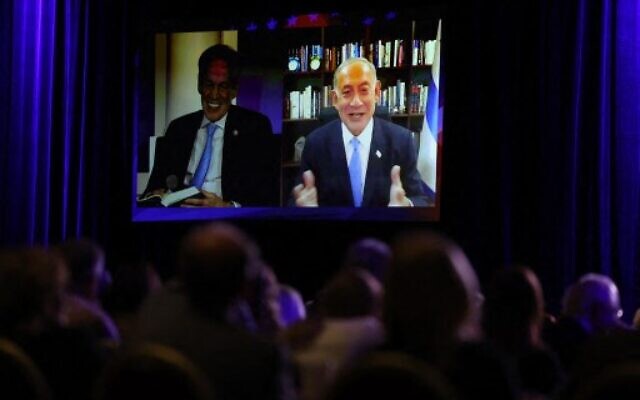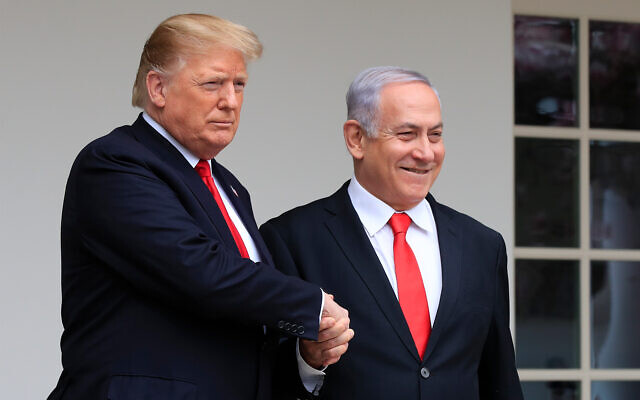I became your enemy because I tell you the truth
Speaking to Republican Jewish Coalition via video, PM-designate hails bipartisan support for Israel, notes respect for Obama, justifies 2015 speech to Congress against Iran deal
Prime Minister-designate Benjamin Netanyahu downplayed his disagreements with US President Joe Biden and highlighted his decades-long friendship with the current leader of the Democratic party during a Saturday address to hundreds of Republican Jews.
The live-streamed interview at the Republican Jewish Coalition’s annual leadership convention in Las Vegas was a rare example of an Israeli leader engaging with such a partisan group and likely bolstered critics’ claims that Netanyahu has prioritized Jerusalem’s ties with Republicans at the expense of the Democrats.
But Netanyahu used the opportunity to note his respect and appreciation for both former US president Barack Obama and Biden, while also stressing the importance of maintaining bipartisan support for the Jewish state in Washington.
Asked about his relationship with Biden, Netanyahu said they’ve been friends for 40 years since he was deputy chief of mission at the Israeli embassy in Washington and Biden was a young senator.
“We formed an easy friendship since then,” Netanyahu said.
“While we disagree on some matters… this is disagreement within the mishpucha — within the family,” Netanyahu quipped. “I’ve had the privilege of dealing with several American presidents, and I can tell you, even though there were occasional differences with Republican and Democratic presidents, I valued the constancy of the American-Israeli alliance.”
Indeed, Netanyahu’s disagreements haven’t just been with Democratic presidents. Since former president Donald Trump left office in 2020, memoirs and reporting on the controversial Republican leader’s tenure revealed that he had grown frustrated with Netanyahu and believed the long-time Israeli leader wasn’t interested in making peace with the Palestinians.
But those quarrels only leaked to the public well after the fact. During the Obama administration, arguments were much more out in the open and it was evident early on that Netanyahu and Obama did not see eye to eye on most issues.
This was most obvious on Iran, with whom the US and other P5+1 nations inked a nuclear deal in 2015, over Netanyahu’s strong objections.
While Netanyahu was careful to stress that he “respected” Obama and thanked him for signing the 2016 Memorandum of Understanding that secured $3.8 billion in US military aid to Israel over ten years, the incoming premier justified his decision to address a joint session of Congress in 2015 in order to lobby against the sitting president’s nuclear agreement.
“It wasn’t a simple decision,” Netanyahu said, explaining that he believed he had to do everything in his power in order to prevent Iran from obtaining a nuclear weapon.
The 2015 speech did not end up swaying enough lawmakers to block the agreement, which traded sanctions relief for curbs to Iran’s nuclear program, and many Democrats have said the speech caused significant damage to Israel’s ties with Democrats.
However, Netanyahu claimed Saturday that it led to improved ties between Israel and Arab states that oppose Iran. Netanyahu said he received calls from Arab leaders after the speech who told him how impressed they were that Netanyahu had stood up to an American president in such a manner.
He suggested that the move helped lay the groundwork for the Abraham Accords normalization agreements Israel signed with several Arab states five years later.
Still, Netanyahu in his Saturday address was careful to praise Trump, whose administration brokered the Abraham Accords.
“I was tremendously fortunate to have, finally, an American administration under President Trump who agreed with this policy,” he said.
Netanyahu claimed the reason those agreements were able to take place was that the Trump administration tossed aside a long-held assumption that peace with the Palestinians had to precede peace with other countries in the region.
“There was one problem with that assumption: The Palestinians didn’t want and don’t want peace with Israel. They want a peace without Israel. They don’t want a state next to Israel, they want a state instead of Israel,” he said to applause from the crowd.
While Netanyahu a decade ago had expressed his support for a two-state solution with the Palestinians, he has long since ceased using the term, saying he would only accept granting the Palestinians limited autonomy over parts of the West Bank where there aren’t any Israeli settlements.
Netanyahu said the Abraham Accords were signed “because we went around the Palestinians” — a mindset likely to irk the Biden administration, which has sought to embrace the Trump initiative while working to make sure that the Palestinians are not sidelined in the process.
Unlike Obama though, the Biden administration has sought to minimize public spats with Israel as much as possible over the past two years. That effort was made easier by the more moderate government that was in place in Jerusalem for the past 18 months and the fact that Biden’s moves to reenter the Iran nuclear deal, from which Trump withdrew, have not borne any fruit.
But the opening of an FBI investigation into the killing of Palestinian-American journalist Shireen Abu Akleh and the expected formation of the most right-wing government in Israeli history are likely to test relations with the US in the months ahead.
Netanyahu is hoping to finalize the establishment of his new government in the coming weeks, returning to power for a sixth term.
Michael Loyman




